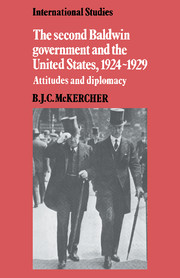Book contents
- Frontmatter
- Contents
- Acknowledgements
- List of abbreviations
- 1 THE SECOND BALDWIN GOVERNMENT AND THE UNITED STATES, NOVEMBER 1924–JUNE 1929
- 2 FOREIGN OFFICE PERCEPTION OF REPUBLICAN FOREIGN POLICY, NOVEMBER 1924–MAY 1927
- 3 THE ONSET OF NAVAL DEADLOCK, JUNE–AUGUST 1927
- 4 BELLIGERENT VERSUS NEUTRAL RIGHTS, AUGUST–DECEMBER 1927
- 5 THE PACT TO RENOUNCE WAR, JANUARY–JULY 1928
- 6 ARBITRATION, BELLIGERENT RIGHTS, AND DISARMAMENT, JANUARY–JULY 1928
- 7 THE CRISIS IN ANGLO-AMERICAN RELATIONS, AUGUST–NOVEMBER 1928
- 8 THE AMERICAN QUESTION RESOLVED, NOVEMBER 1928–JUNE 1929
- Notes
- Bibliography
- Index
8 - THE AMERICAN QUESTION RESOLVED, NOVEMBER 1928–JUNE 1929
Published online by Cambridge University Press: 10 November 2009
- Frontmatter
- Contents
- Acknowledgements
- List of abbreviations
- 1 THE SECOND BALDWIN GOVERNMENT AND THE UNITED STATES, NOVEMBER 1924–JUNE 1929
- 2 FOREIGN OFFICE PERCEPTION OF REPUBLICAN FOREIGN POLICY, NOVEMBER 1924–MAY 1927
- 3 THE ONSET OF NAVAL DEADLOCK, JUNE–AUGUST 1927
- 4 BELLIGERENT VERSUS NEUTRAL RIGHTS, AUGUST–DECEMBER 1927
- 5 THE PACT TO RENOUNCE WAR, JANUARY–JULY 1928
- 6 ARBITRATION, BELLIGERENT RIGHTS, AND DISARMAMENT, JANUARY–JULY 1928
- 7 THE CRISIS IN ANGLO-AMERICAN RELATIONS, AUGUST–NOVEMBER 1928
- 8 THE AMERICAN QUESTION RESOLVED, NOVEMBER 1928–JUNE 1929
- Notes
- Bibliography
- Index
Summary
In a struggle between the United States and ourselves, it would not be the possession of a few 8″ gun ships more or less, but the relative economic strength of the two sides which would decide the day.
Wellesley, March 1929The Foreign Office response to its critics
The unfavourable American reaction to the disarmament compromise provided the domestic critics of the Baldwin government's foreign policy with the opportunity to profit out of the souring of Anglo-American relations. They latched onto Coolidge's Armistice Day speech as proof that the American question had been mishandled. In late August Cecil had been sanguine about the direction of British foreign policy, chiefly because of the success of the renunciatory pact diplomacy. Although puzzled about how the announcement of the compromise had been made, he thought the government would be able to wriggle out of any difficulty. A month later his opinion had changed. He considered using the League of Nations Union to take Baldwin's government to task over the agreement with the French, but the timing was wrong. Baldwin had agreed to give the key-note address at the tenth anniversary celebrations of the Union. Despite the Union's leaders' antipathy toward the Conservative Party, a speech by the prime minister would add to the prestige of the League movement in Britain. Realising that an attack on the government from a Union platform would be ill-advised, Cecil dissociated his criticism of Conservative foreign policy from the views of the Union.
- Type
- Chapter
- Information
- The Second Baldwin Government and the United States, 1924–1929Attitudes and Diplomacy, pp. 171 - 200Publisher: Cambridge University PressPrint publication year: 1984



